| Srl | Item |
| 1 |
ID:
128250
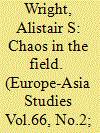

|
|
|
|
|
| Publication |
2014.
|
| Summary/Abstract |
This article traces the creation, experiences and success of Karelia's food supply detachments during the Russian Civil War and focuses on three target provinces: Kursk, Simbirsk and Saratov. It emphasises the early political and economic stumbling blocks faced by the Bolsheviks in their attempts to implement the party's food supply policies in the periphery and indicates that, although the Soviet food supply system by mid-1919 was more centralised and resistance from local soviets lessened, improvements were only relative to the more chaotic conditions of the previous year.
|
|
|
|
|
|
|
|
|
|
|
|
|
|
|
|
| 2 |
ID:
131425
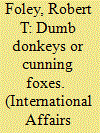

|
|
|
|
|
| Publication |
2014.
|
| Summary/Abstract |
The idea that the armies of the First World War were incapable of learning is one of the most enduring myths of the conflict. This image of 'lions led by donkeys' has proved difficult to modify, despite the sizeable scholarly literature on the tactical, technological and organizational adaptation and innovation undergone by all armies during the war. By examining the British and German armies as learning organizations during the war, this article contributes to the growing literature on wartime adaptation and innovation, as well as the wider literature on organizational learning in wartime. It demonstrates how the organizational cultures of these two armies shaped the way in which they learned, predisposing the British army towards radical, often technological, solutions to the tactical and operational challenges of the First World War battlefield, while inclining the German army towards incremental and tactical solutions to the same problems.
|
|
|
|
|
|
|
|
|
|
|
|
|
|
|
|
| 3 |
ID:
131185
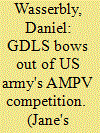

|
|
|
|
|
| Publication |
2014.
|
| Summary/Abstract |
General dynamics land system (GDLS) will not bid on the US Army's armored multipurpose vehicle (AMPV) programme and not take the army to court over a requirement dispute, officials said.
|
|
|
|
|
|
|
|
|
|
|
|
|
|
|
|
| 4 |
ID:
128089
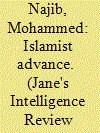

|
|
|
|
|
| Publication |
2012.
|
| Summary/Abstract |
With its strong focus on nationalism, the militant Islamism group has become a major challenger to Hamas's authority in the Gaza Strip. Mohammed Najib examines the rise of Palestine Islamist Jihad and its armed wing that has links to Syria and Iran
|
|
|
|
|
|
|
|
|
|
|
|
|
|
|
|
| 5 |
ID:
125359
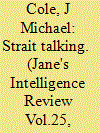

|
|
|
|
|
| Publication |
2013.
|
| Summary/Abstract |
China is continuing to build up its military strengths while increasing ties with Taiwan, as Beijing maintains its camps on the island, J Michael Cole examines how the shifting balance of forces raises the threat of blockade and arms conflicts facing Taiwan.
|
|
|
|
|
|
|
|
|
|
|
|
|
|
|
|
| 6 |
ID:
127864
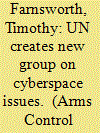

|
|
|
|
|
| Publication |
2013.
|
| Summary/Abstract |
The UN General Assembly First Committee in October and November adopted resolutions creating a new group of governmental experts to follow up on an earlier study that reflected a consensus within a 15-member group of experts on some of the most contentious issues of state behavior in cyberspace. That study, issued in June, determined that current international law, including the law of armed conflict, applies to state behavior in cyberspace. (See ACT, July/August 2013.) The United States and many of its allies had long held that position, but some key countries had argued against it.
|
|
|
|
|
|
|
|
|
|
|
|
|
|
|
|